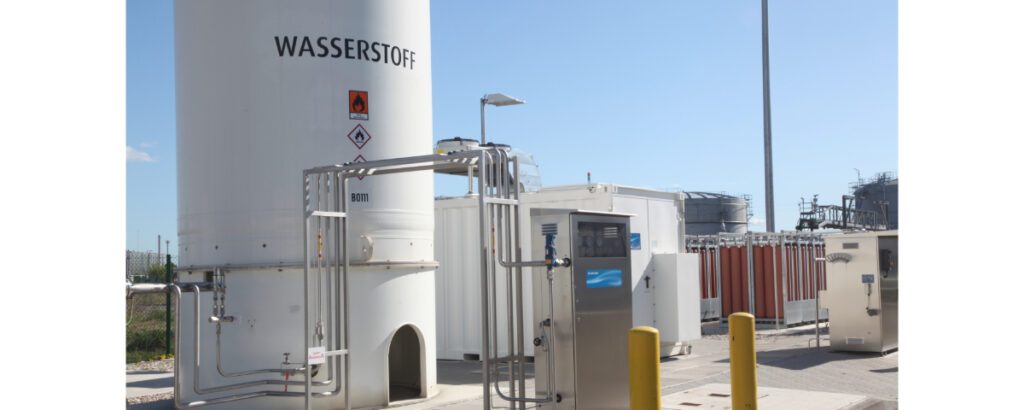Hydrogen production in Germany: New study shows advantages of decentralized electrolysers
Hamburg/Berlin, march 10. 2022 | Decentralized electrolysers improve the energy yield from wind and solar plants, make our energy system more resilient and save grid expansion costs. This is shown by a new study conducted by the Reiner Lemoine Institute (RLI) on behalf of the eco-energy cooperative Green Planet Energy eG (formerly Greenpeace Energy). Such decentralized electrolysers use local surpluses from wind and solar power in a way that is economically advantageous for the production of green hydrogen. They can be operated economically in many grid areas throughout Germany.
Electrolysers with a peak output of up to five megawatts (MW) are particularly suitable for grid-serving operation. “Such electrolysers can react flexibly to the fluctuating supply of wind and solar power and control signals from the distribution grid operators. They thus make an important contribution to grid stability and supply security. The energy system thus becomes more efficient, more resilient and more cost-effective,” explains RLI Managing Director Dr. Kathrin Goldammer.
According to the study, depending on the expansion of renewable energies, grid-serving small electrolysers could produce a total of up to 13.7 terawatt hours (TWh) of green hydrogen per year. That’s about half of the German government’s planned domestic production volumes of green hydrogen for 2030. “The government is currently focusing primarily on large electrolysers,” says Carolin Dähling, hydrogen expert at Green Planet Energy. “We strongly advise supplementing them with small electrolysers. The new study shows that these can significantly strengthen our future renewable energy system. The German parliament and government must now create the appropriate legal framework for this” demands Dähling.
To this end, the eco-energy cooperative proposes three measures in particular:
– The German government should set the course for the installation of 5 gigawatts (GW) of grid-serving electrolysers by 2030.
– The German Federal Network Agency (Bundesnetzagentur) is to present a map showing suitable locations for such electrolysers.
– A temporary subsidy via Contracts for Difference (CfDs) is intended to stimulate the rapid installation of grid-serving electrolysers. CfDs compensate for the price difference between gray and green hydrogen for a transitional period.
Green Planet Energy believes that the expansion of decentralized electrolysers will be driven primarily by small and medium-sized companies with local roots. This strengthens regional value creation and creates economic benefits. “However, because various risks are currently still hampering the desirable ramp-up, we believe that a limited start-up subsidy makes sense,” explains Carolin Dähling.
“Our analysis of the strengths and weaknesses of grid-serving electrolysers comes to a clear conclusion: decentralized electrolysers can be operated economically and are positive for the energy system. The advantages of their use outweigh the disadvantages,” summarizes Kathrin Goldammer from RLI. “For energy transition and security of supply, we need to produce large quantities of green hydrogen in Germany as well,” says Green Planet Energy expert Dähling. “Compared to large plants, small electrolysers have clear advantages in this regard, which we should definitely take advantage of.”
About the RLI
The Reiner Lemoine Institute (RLI) is an independent, non-profit research institute that has been working for a future with 100 percent renewable energies since 2010. The scientists at RLI have conducted applied research to scientifically support the long-term transition of the energy supply system towards renewable energy. The RLI’s open source models have firmly established themselves in energy system modeling. The institute‘s mobility and electrification concepts have been implemented by private companies as well as the public sector worldwide.
About Green Planet Energy
Green Planet Energy – Greenpeace Energy until fall 2021 – is a nationwide eco-energy cooperative based in Hamburg, Germany, founded in 1999 by the environmental protection organization Greenpeace e.V.. With its subsidiary Green Planet Projects GmbH, the cooperative has already invested more than 240 million euros in the expansion of renewable energies. Green Planet Energy has more than 28,500 members and supplies around 215,000 customers with particularly high-quality green electricity and the ambitious gas product proWindgas.
Go to project page here.
Media contact RLI
Timo Beyer
Communication
Tel.: 030 12084 3415
E-Mail: presse@rl-institut.de
Media contact Green Planet Energy
Michael Friedrich
Politics and Communication
Tel.: 040 808 110 655
E-Mail: michael.friedrich@gp.de
